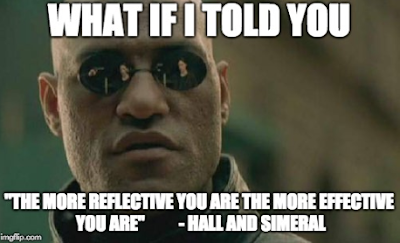Week #32: PRACTICE - Key Change in Reflective Practice
Here we are in my final week of my Mindlab course and this week's challenge is to talk about my 32 week journey and reflect on the change in my practice using Rolfe’s model of reflection.
Step 1 (What): Identify one key change in your professional practice
One of the things that came from participating in this course is that I guess it has forced me to actually 'do' the things and 'make' the time required to be an effective practitioner. I have had to find time to research articles, find evidence to back up my theories and learn more about effective teaching styles and theories. This course has been intense and massively time consuming which in hindsight I wouldn't have undertaken considering my already hectic schedule as a Deputy Principal and classroom practitioner. I found myself doubting whether I could actually complete this course and if it weren't for the corroboration and collegial support of a friend and colleague I doubt I would have managed.
While this has been an all encompassing journey and has supported our understandings of and successful implementation to meet the requirements of our New Zealand Curriculum and our Codes of Standards. The specific criteria it has helped me with, as my capacity as the DP in my school, has been the ability to lead and re-write our schools Måori and Pasifika Action Plan. Most of my journey has been about how important the home-school relationship is. All of the ministry documents suggest that if the home-school relationship is strong then the children have a better chance of success. This then led me to work with my colleagues to develop an action plan that will help us to develop and strengthen our relationships with our tamariki and their whånau.
Step 2 (Now what): Evaluate the identified change
Using Osterman and Kottkamp (2015, p.70) “Reflective Practice for Educators” the Cycle of Experiential Learning Model I will reflect on my change of practice. This model provides 4 basic stages in order critically reflect on my practice.
Stage 1: Problem identification
Undertaking this course has really alerted me to the importance of having positive relationships with the families of the children at our school. One of the things that was prominent while doing our inquiry is the difference between the children who had strong positive family role modelling compared to those whose parents had little or no input into their child's education. While my inquiry was specifically on engaging children in their reading this certainly had a considerable impact on all their schooling levels and made a huge difference to their child's learning and attitude. According to the New Zealand Curriculum this curriculum has meaning for students, connects with their wider lives, engages the support of their families, whånau, and communities. (2007, p11)
Stage 2: Observation and Analysis
We developed a hunch through observation of the children and their level of attention and ability, the communication or lack thereof with parents, the observation for non-attendance at parent teacher conferences, the children's own attitude to learning and school and their attendance record, data from tests and also surveys with children and with their families. From this we can only speculate that if the child does not have positive modelling and respect for education at home then the children also do not have this. The ones achieving well are the ones whose families are engaged in their child's education.
Stage 3: Abstract re conceptualization
This is where we asked ourselves why? Why are these parents not engaged in their child's schooling? What can we do to being them onboard and get them more actively involved. Are they lacking in education themselves, do they need support, is there a cultural difference where they do not feel welcome?
Stage 4: Active experimentation
Research suggests that we need to have good communication and build positive relationships with parents in order for them to become engaged. This inspired us to formulate a plan to help build more positive relationships with the whånau and the community. We are developing a plan to acknowledge who in the school has the best relationship with each of our Måori or Pasifika (and other majority ethnic groups) families. These staff members will take a lead role in encouraging these families to come along to more school events. We will also host events specific to each culture in our school where the Senior Leadership team will share our children's celebrations and successes. We will provide plenty of opportunities for staff to develop a strong bond between home and school.
Step 3 (What next) Share your next plan(s) regarding your future professional development or your future practice.
Right now I need to continue with the inquiry I have started and see whether we have indeed made a difference. Once I have evidence of this I can then either support other teachers in their journey to encourage engagement or if the evidence shows no difference then I will have to change tactics and look at what other ways I can get the children engaged in their learning.
References:
Step 1 (What): Identify one key change in your professional practice
One of the things that came from participating in this course is that I guess it has forced me to actually 'do' the things and 'make' the time required to be an effective practitioner. I have had to find time to research articles, find evidence to back up my theories and learn more about effective teaching styles and theories. This course has been intense and massively time consuming which in hindsight I wouldn't have undertaken considering my already hectic schedule as a Deputy Principal and classroom practitioner. I found myself doubting whether I could actually complete this course and if it weren't for the corroboration and collegial support of a friend and colleague I doubt I would have managed.
Thank you so much Sharon🐶
Step 2 (Now what): Evaluate the identified change
Using Osterman and Kottkamp (2015, p.70) “Reflective Practice for Educators” the Cycle of Experiential Learning Model I will reflect on my change of practice. This model provides 4 basic stages in order critically reflect on my practice.
Stage 1: Problem identification
Undertaking this course has really alerted me to the importance of having positive relationships with the families of the children at our school. One of the things that was prominent while doing our inquiry is the difference between the children who had strong positive family role modelling compared to those whose parents had little or no input into their child's education. While my inquiry was specifically on engaging children in their reading this certainly had a considerable impact on all their schooling levels and made a huge difference to their child's learning and attitude. According to the New Zealand Curriculum this curriculum has meaning for students, connects with their wider lives, engages the support of their families, whånau, and communities. (2007, p11)
Stage 2: Observation and Analysis
We developed a hunch through observation of the children and their level of attention and ability, the communication or lack thereof with parents, the observation for non-attendance at parent teacher conferences, the children's own attitude to learning and school and their attendance record, data from tests and also surveys with children and with their families. From this we can only speculate that if the child does not have positive modelling and respect for education at home then the children also do not have this. The ones achieving well are the ones whose families are engaged in their child's education.
Stage 3: Abstract re conceptualization
This is where we asked ourselves why? Why are these parents not engaged in their child's schooling? What can we do to being them onboard and get them more actively involved. Are they lacking in education themselves, do they need support, is there a cultural difference where they do not feel welcome?
Stage 4: Active experimentation
Research suggests that we need to have good communication and build positive relationships with parents in order for them to become engaged. This inspired us to formulate a plan to help build more positive relationships with the whånau and the community. We are developing a plan to acknowledge who in the school has the best relationship with each of our Måori or Pasifika (and other majority ethnic groups) families. These staff members will take a lead role in encouraging these families to come along to more school events. We will also host events specific to each culture in our school where the Senior Leadership team will share our children's celebrations and successes. We will provide plenty of opportunities for staff to develop a strong bond between home and school.
Step 3 (What next) Share your next plan(s) regarding your future professional development or your future practice.
Right now I need to continue with the inquiry I have started and see whether we have indeed made a difference. Once I have evidence of this I can then either support other teachers in their journey to encourage engagement or if the evidence shows no difference then I will have to change tactics and look at what other ways I can get the children engaged in their learning.
References:
Ministry of Education (2007). The New Zealand Curriculum. Retrieved from http://nzcurriculum.tki.org.nz/The-New-Zealand-Curriculum
Ministry of Education (2017). Our code, our standards. Retrieved from https://educationcouncil.org.nz/content/our-code-our-standards
Osterman, K. F., & Kottkamp, R. B. (2015). Reflective practice for educators: professional development to improve student learning.(2nd ed.) New York: Skyhorse Publishing.








Comments
Post a Comment